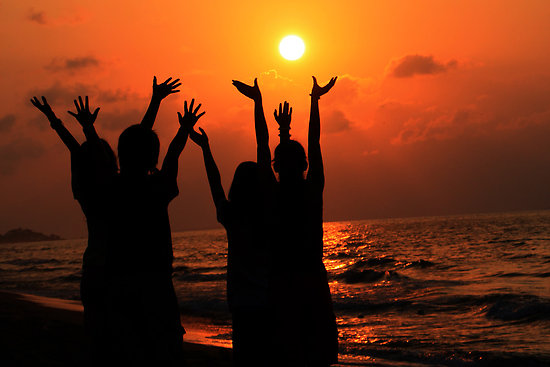Solar Energy Within and Without
 The Vedas worship the Sun, Surya, as the source of light for the entire world. But for the Vedic people, light is not a material force but a power of life, love and intelligence. Nor is the Sun a distant entity unrelated to us. It has a presence on Earth through the power of its rays, which not only pervade our environment but also touch our very hearts. By the Sun the Vedas don’t simply refer to the outer luminary, the central star of our solar system. They mean the principle of light and consciousness on a universal level, of which the Sun is our local representative.
The Vedas worship the Sun, Surya, as the source of light for the entire world. But for the Vedic people, light is not a material force but a power of life, love and intelligence. Nor is the Sun a distant entity unrelated to us. It has a presence on Earth through the power of its rays, which not only pervade our environment but also touch our very hearts. By the Sun the Vedas don’t simply refer to the outer luminary, the central star of our solar system. They mean the principle of light and consciousness on a universal level, of which the Sun is our local representative.
One of the main problems in the world today is the energy crisis, which is endangering the very roots of life on the planet. Where can we get the power to run all our new technology, industry, transportation and media? Our energy needs are increasing daily with the growth in population and the increasing affluence of the third world that is now demanding the same conveniences that the western world has enjoyed for decades.
 Where do we get this additional energy? And how can we create it without destroying the planet by pollution that is the by product of most of our energy sources? Solar power is the ultimate answer for the energy crisis because it is a clean source of energy that is unlimited, though the technology for it may take a few decades more to develop fully. We must make solar power the priority in energy research. We must return to the Sun to save the Earth.
Where do we get this additional energy? And how can we create it without destroying the planet by pollution that is the by product of most of our energy sources? Solar power is the ultimate answer for the energy crisis because it is a clean source of energy that is unlimited, though the technology for it may take a few decades more to develop fully. We must make solar power the priority in energy research. We must return to the Sun to save the Earth.
The Vedas are said to reside in the rays of the Sun, which hold the Vedic mantras. The Vedas are the manifestation of solar intelligence, the light of consciousness on Earth. The sacred syllable OM itself is the sound of the Sun and the essence of the Vedas. The Vedic mantras carry light and power both for the body and the mind. India, therefore, should be at the forefront of solar research in order to keep up with its ancient Vedic heritage.
 Our society is also complaining about low energy on a personal level. Particularly, in the developed world low energy diseases like chronic fatigue, depression and weak immune conditions are almost epidemic. Many people find that they lack the vitality to do what they want to do. Even if we try to meditate in order to contact a higher power, we often end up falling to sleep in the process and get nowhere owing to a lack of mental energy.
Our society is also complaining about low energy on a personal level. Particularly, in the developed world low energy diseases like chronic fatigue, depression and weak immune conditions are almost epidemic. Many people find that they lack the vitality to do what they want to do. Even if we try to meditate in order to contact a higher power, we often end up falling to sleep in the process and get nowhere owing to a lack of mental energy.
According to the Vedas, the inner Sun is Prana or vital energy, which manifests through the breath. To increase our personal energy, both for physical health and for mental acuity, the best practice is Pranayama or breath control. Breath carries the subtle essence of speech, which is mantra.
 The in-breath carries the sound ‘so’ and the outbreath carries the sound ‘ha’. The natural mantra “So’ham” in Sanskrit means, “He am I,” referring to the Purusha or consciousness in the Sun, as the Isha Upanishad (v. 6) so eloquently proclaims.
The in-breath carries the sound ‘so’ and the outbreath carries the sound ‘ha’. The natural mantra “So’ham” in Sanskrit means, “He am I,” referring to the Purusha or consciousness in the Sun, as the Isha Upanishad (v. 6) so eloquently proclaims.
Our very breath is based upon unity with the solar creator and source of life and can be used to connect with its power.
We all want to increase our intelligence, concentration, memory and capacity for information.
 This is the key to strength and success in the information age. The best way to do this is to harness the power of the inner Sun, which is to connect with cosmic intelligence through mantra and meditation. Each one of us possesses a portion of the light of consciousness, a ray of the solar creator that endows us with understanding. This faculty is called ‘dhi’ in Vedic thought refers to the meditative aspect of the mind (dhyana manas) and ‘buddhi’ in later Indian thought, referring to awakened intelligence.
This is the key to strength and success in the information age. The best way to do this is to harness the power of the inner Sun, which is to connect with cosmic intelligence through mantra and meditation. Each one of us possesses a portion of the light of consciousness, a ray of the solar creator that endows us with understanding. This faculty is called ‘dhi’ in Vedic thought refers to the meditative aspect of the mind (dhyana manas) and ‘buddhi’ in later Indian thought, referring to awakened intelligence.
The best mantra for awakening the higher mind is the Gayatri mantra, which is a mantra to the solar light of consciousness to awaken our meditative mind (dhi). It brings us the Divine solar power of consciousness, love and prana—the supreme light of truth.
Vishvamitra and the Gayatri Mantra
 The Gayatri mantra was the gift to the world of the great Rishi Vishvamitra, seer of the third book of the Rigveda. Vishvamitra was one of the greatest Vedic Rishis but also the most controversial. He began as a great king and warrior who wanted to add spiritual power to his worldly conquests.
The Gayatri mantra was the gift to the world of the great Rishi Vishvamitra, seer of the third book of the Rigveda. Vishvamitra was one of the greatest Vedic Rishis but also the most controversial. He began as a great king and warrior who wanted to add spiritual power to his worldly conquests.
This brought him in contact and in conflict with Vasishtha, the greatest and purest of the Rishis. Vishvamitra persisted through all difficulties, including those created by his own ambition, until after a long period of struggle through his will power and tapas he ultimately achieved Self-realization. Vishvamitra’s path, therefore, was more of human effort than Divine grace.
His was the path of the warrior, of discipline and struggle, defeat and victory. He shows the development of an indomitable will that can overcome all obstacles and even challenge the Gods.
 Vishvamitra by his tapas eventually created such an internal fire that it began to threaten the Gods in heaven by its heat. For this the Gods sent the celestial nymph (apsara) Menaka to seduce him and take him off his path.The strategy succeeded, but not for long, and to fulfill another purpose that perhaps the Gods had not planned.
Vishvamitra by his tapas eventually created such an internal fire that it began to threaten the Gods in heaven by its heat. For this the Gods sent the celestial nymph (apsara) Menaka to seduce him and take him off his path.The strategy succeeded, but not for long, and to fulfill another purpose that perhaps the Gods had not planned.
From his union with Menaka, Vishvamitra begat a daughter, Shakuntala, who eventually became the wife of King Dushyanta.
 From the union of Dushyanta and Shakuntala was born King Bharata, from whom the name of India as Bharat arose. The whole country of India, through its determinative dynasty carries the blood and spirit of Vishvamitra, which is closely connected to that of the warrior Goddess Durga.
From the union of Dushyanta and Shakuntala was born King Bharata, from whom the name of India as Bharat arose. The whole country of India, through its determinative dynasty carries the blood and spirit of Vishvamitra, which is closely connected to that of the warrior Goddess Durga.
Vishvamitra’s Gayatri mantra is the most important mantra of the Hindus, probably still recited by half the people in India today. It is the most sacred Vedic mantra, reciting at sunrise, noon and sunset.
Om tat savitur vareNyaM bhargo devasya dhîmahi dhiyo yo nah prachodayât
We can literally translate it as:
We meditate upon the supreme effulgence of the Divine Solar Creator that he may inspire our intelligence!
 The Gayatri mantra encourages creative thinking, not as mere human invention but as our portion of cosmic intelligence. It exhorts us to attune ourselves to the cosmic mind and its laws of dharma. This chant is as valuable and appropriate in the modern world as it was in ancient times. We can use it whenever we wish to gain new insight and inspiration or to increase memory and concentration, even for mundane tasks.
The Gayatri mantra encourages creative thinking, not as mere human invention but as our portion of cosmic intelligence. It exhorts us to attune ourselves to the cosmic mind and its laws of dharma. This chant is as valuable and appropriate in the modern world as it was in ancient times. We can use it whenever we wish to gain new insight and inspiration or to increase memory and concentration, even for mundane tasks.
Vishvamitra in the Rigveda states that his prayer or Brahma protects the Bharata people:
(visvamitrasya raksati brahmedam bharatam janam, Rig Veda III.53.12).
His prayer of course is the Gayatri mantra. As long as that mantra is recited in India, its ancient spiritual heritage will be preserved. India should not forget the Gayatri mantra, Vishvamitra or its connection to the Sun. That is the key to its destiny as a nation.
Humanity also must remember the Divine Self in the Sun, the Prana that is the universal energy, and our role in the cosmos to bring the Divine light of knowledge into the darkness of physical matter. This is not an issue of mere science and technology. It requires an inner science of Yoga and the enlightenment of the mind.

































